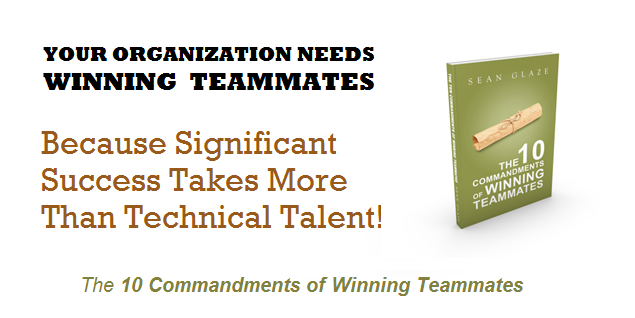 I got an email from a client that asked me for advice about a group of employees.
I got an email from a client that asked me for advice about a group of employees.
In her words they were “having a hard time working together because they just don’t seem to like each other.”
She asked what she could do to help the situation.
Basically she was asking the same thing many team leaders ask themselves: how can I get my people to like each other more… so they work better together?
Well, let me share a terrible little secret with you…
Some of the best teams I ever coached had a little conflict between personalities on the team.
People do not have to be best friends in order to be Winning Teammates!
Communication is essential.
Competence is essential.
Consideration is essential.
Camaraderie is not.
Every group seems to have a sandpaper person.
That said, I DO believe that there are ways for you to help ease the tension between people who need to talk and understand how their work impacts (and is impacted by) others.
Before we discuss that, though, I think it is important to review what things actually keep us from “liking” others on our team…
There are TWO main culprits that lead to dislike:
1 – Not knowing much about them or their role
2 – Not getting past something they did or said
Not knowing much about them becomes a problem because our default behavior as humans is to dislike what we don’t understand. We often assume the negative in the absence of information, and that leads to distrust. So poor communication leads to even less communication because we usually avoid what we don’t like.
Not knowing much about their role becomes a problem because human nature often leads us to assume the worst about people in the absence of information. Once you understand the challenges and responsibilities they have, you may be less negative in your perception of them.
Not getting past something they did or said is a bit tougher…
But there is hope!
First, have a conversation and determine what the cause of the conflict is…
It is far more effective to address a situation and deal with it than to ignore it and allow it to fester and infect your company culture.
Once you have diagnosed the reason (or reasons) that your people seem to NOT like each other, you can begin to prescribe experiences that will help to improve those perceptions.
1 – If not knowing much about them or their role is the issue, you can schedule a team building event for your next office workday to ensure that they build more of a relationship. Connecting is about understanding other’s responsibilities and background – and that leads to empathy, which is a powerful force.
2 – If not getting past something they did or said is the issue, you can suggest a couple of powerful ideas to them:
– Be the Bigger Person
In the Disney movie, Frozen, Elsa sings “Let it GO,” a song that many team members have had to sing to themselves in order to maintain a positive attitude.
That doesn’t mean that the hurt was any less or that the behavior was acceptable – it just means that sometimes the best thing you can do is to accept an apology that you didn’t get, so you can let go of the anger and resentment and move forward.
– See the Bigger Goal
Even if you struggle to let go of the hurt and forgive their past behaviors, you can still be a productive member of the team without having to leave it.
A Winning Teammate sees him or herself as a small contributing part of something larger than themselves. You are part of the team because you can contribute to a compelling common goal. If your focus is on the hurt, the goal becomes less significant and progress will be slow and difficult.
But if you shift your focus to the goal – then you can respect the other person’s contributions and accept that (while not ideal) you can work toward the goal without having to be best friends.
Most every situation can improve with intention and effort!
But remember – your employees and teammates don’t have to be best friends.
What you have to have on your team are TWO important connections.
First, your people need to connect to a compelling common goal – they need to understand what they are there to accomplish and how they are interdependent on others to achieve that success.
And second, your people need to connect to each other – they need to understand who they are working with and the background, skills, desires, and challenges of their teammates. This information does not excuse poor effort or attitudes… but it does improve awareness and empathy.
And all accountability is based on empathy.
Team building experiences simply provide the activities and discussions that lead to the empathy and connections that you desire to achieve.
Every team has conflict – and not all conflict is bad.
But if the people on your team need a bit f help to like each other and work together more productively, these suggestions will hopefully be useful…

